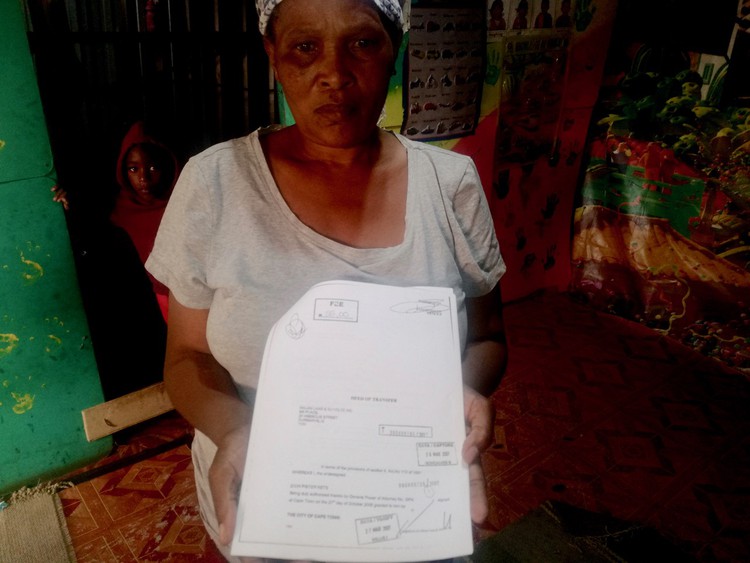Hout Bay residents have title deeds but no houses
Bureaucratic bungling has left dozens in limbo for 13 years
“Administrative error” has left 37 households in Imizamo Yethu sitting for 13 years with title deeds but no houses.
“I get water bills, but I live in an informal settlement,” says 58-year-old Lungiswa Mahashe.
She received a title deed to a house in March 2005. But 13 years later, she is still in a shack and does not know if she will ever get a house. Mahashe lives with her husband, two children and six grandchildren in a three-room shack. She has lived in Imizamo Yethu for 27 years.
“People that used to be my neighbours are living in their houses but I am not, and no one is doing anything about it … Most days I go past what could have been my house but someone else is living it, and no one can explain to me how it happened,” says Mahashe.
Veliswa Nkopha also has a title deed, but with her ID number and someone else’s name. She says the City of Cape Town told her she should fix the problem at the Department of Home Affairs as perhaps more than one person had her ID number. Home Affairs told her the ID number is in her name and there is nobody else with that number.
“I just do not know what this means. Does it mean I will never get a house because someone else is living in mine?” asked Nkopha.
Meanwhile, Nkopha lives in a two-roomed shack and shares her bedroom with six grandchildren. While living in Imizamo Yethu, she has been the victim of several fires that have ravaged the informal settlement.
Councillor Brett Herron, Mayoral Committee Member for Urban Development, said “administrative error” was to blame for the debacle. Herron said that during the Masakhane Bantu People’s Housing Project in Imizamo Yethu in 2009, incorrect title deeds had been registered. He said some plots had been swapped between beneficiaries.
“This is not unusual in housing projects, where, for example, beneficiaries are no longer interested in benefiting from a particular project. At the time, the community, the City and the support organisation agreed on the swaps. The swaps were properly documented,” said Herron.
“Unfortunately, at the time the title deeds were transferred, the transfers were registered according to the original beneficiary list and not the list that included the swaps that took place. This caused a mix-up of title deeds and caused a lot of frustration among beneficiaries,” he said.
When GroundUp asked some of the beneficiaries whether or not they had agreed to swap their houses, Zion Sigcawu was the first to say no. “Who would agree to giving up their houses to other people, and for what? If we wanted to swap houses, what were we swapping them for? Why are we not in houses?” she asked.
But Mahashe told GroundUp that the City had asked them to swap their title deeds with the people living in the houses, so they could be accommodated in a new housing project in Imizamo Yethu. She said they had agreed to this.
Herron said the City was looking into land which might be suitable for building houses for the affected residents. However, he said, “the sites have steep slopes and/or unstable soils. Pending the outcome of an investigation, some of the sites may not be suitable for building houses.” In which case, he said, the City would accommodate the residents elsewhere.
Support independent journalism
Donate using Payfast

Don't miss out on the latest news
We respect your privacy, and promise we won't spam you.
Next: Why the Fish River Sun land claim case took 20 years
Previous: Durban woman’s pension vanishes in unexplained loans
© 2018 GroundUp. 
This article is licensed under a Creative Commons Attribution-NoDerivatives 4.0 International License.
You may republish this article, so long as you credit the authors and GroundUp, and do not change the text. Please include a link back to the original article.

